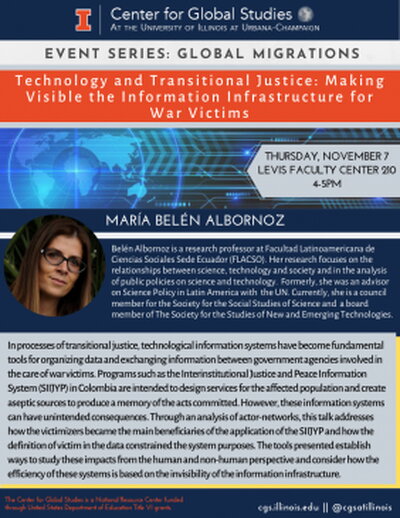
On November 7-8, 2019, CGS proudly hosted Professor María Belén Albornoz from Facultad Latinoamericana de Ciencias Sociales Sede Ecuador (FLACSO). On November 7th, she presented “Technology and Transitional Justice: Making Visible the Information Infrastructure for War Victims”. Her visit was co-sponsored by the Center for Latin American and Caribbean Studies, Women & Gender in Global Perspectives Program, Institute of Communications Research, and Community Data Clinic at the National Center for Supercomputing Applications.

Event Description: In processes of transitional justice, technological information systems have become fundamental tools for organizing data and exchanging information between government agencies involved in the care of war victims. Programs such as the Interinstitutional Justice and Peace Information System (SIIJYP) in Colombia are intended to design services for the affected population and create aseptic sources to produce a memory of the acts committed. However, these information systems can have unintended consequences. Through an analysis of actor-networks, this talk addressed how the victimizers became the main beneficiaries of the application of the SIIJYP and how the definition of victim in the data constrained the system purposes. The tools presented established ways to study these impacts from the human and non-human perspective and consider how the efficiency of these systems is based on the invisibility of the information infrastructure.
Speaker Bio: Belén Albornoz is a research professor at Facultad Latinoamericana de Ciencias Sociales Sede Ecuador (FLACSO). Her research focuses on the relationships between science, technology and society and in the analysis of public policies on science and technology. Formerly, she was an advisor on Science Policy in Latin America with the UN. Currently, she is a council member for the Society for the Social Studies of Science and a board member of The Society for the Studies of New and Emerging Technologies.